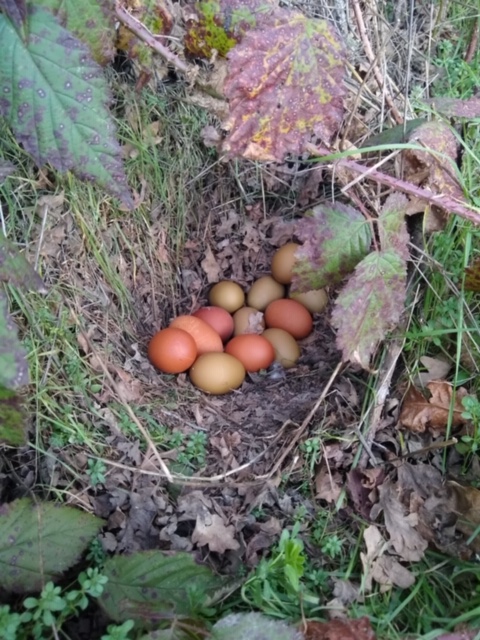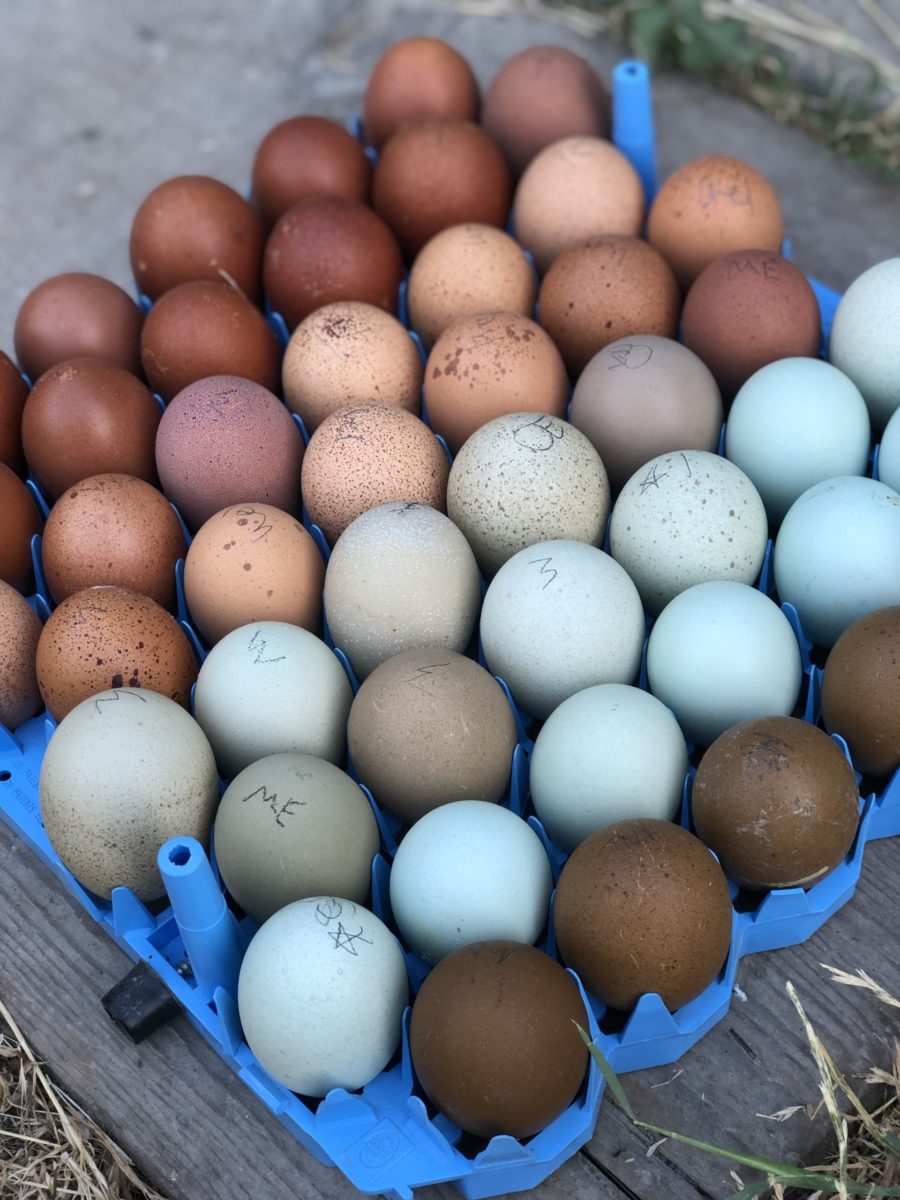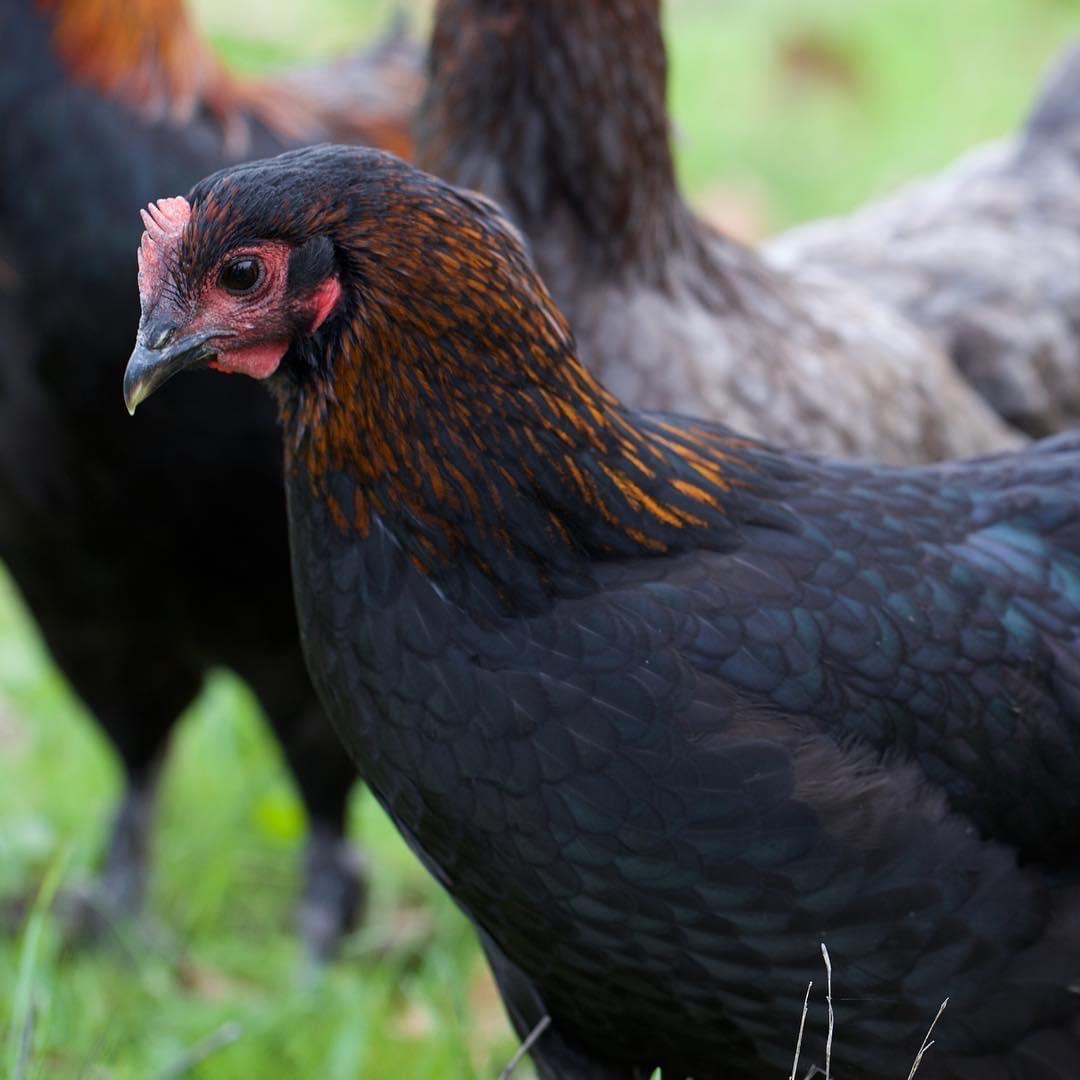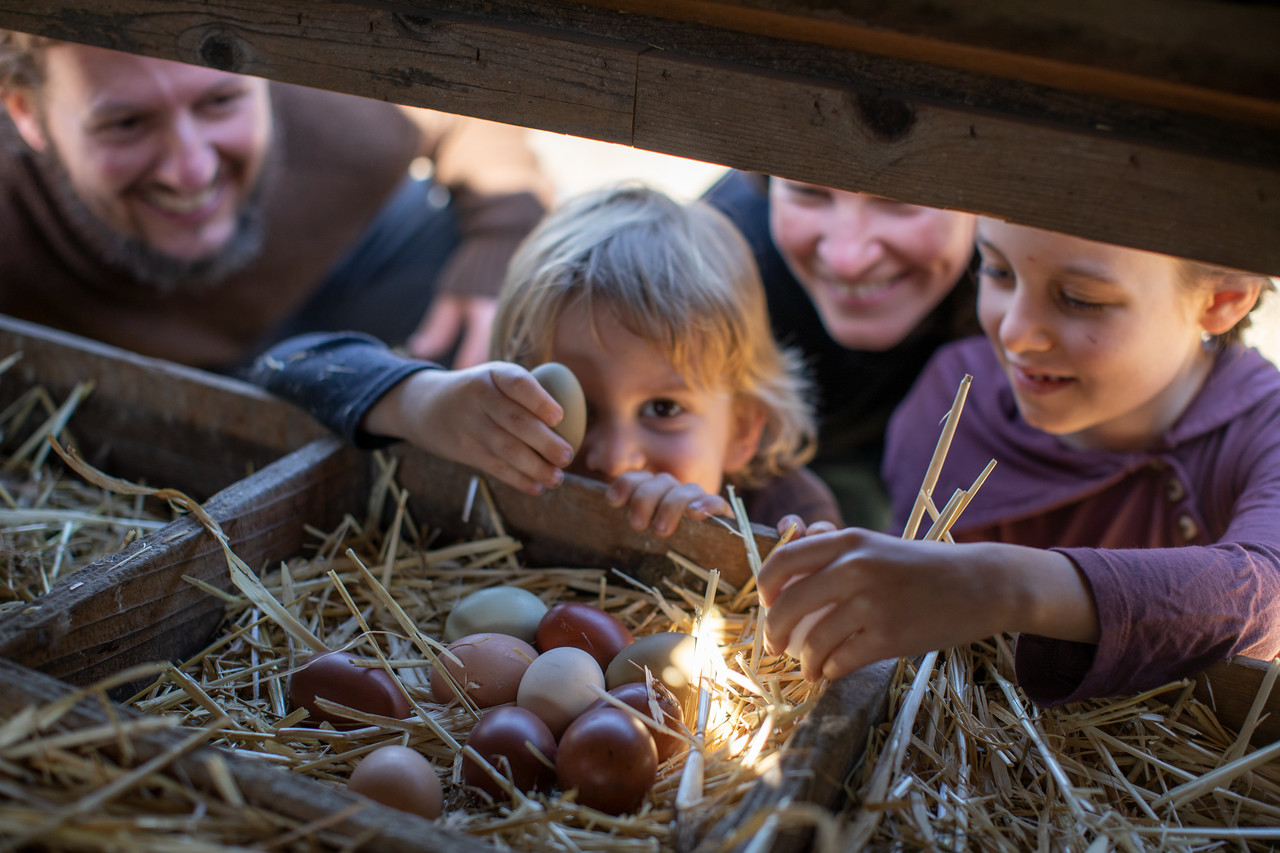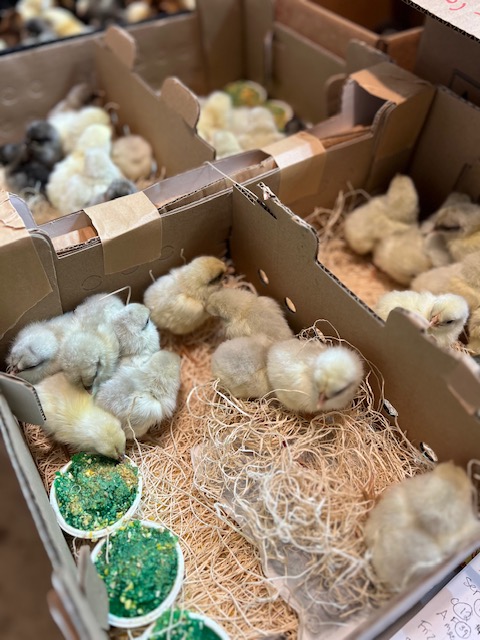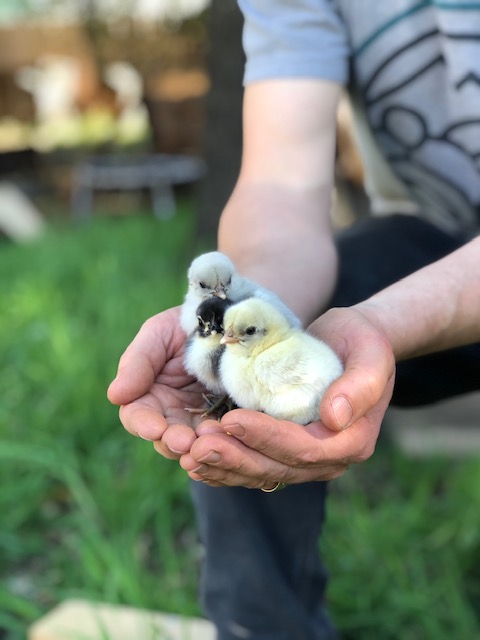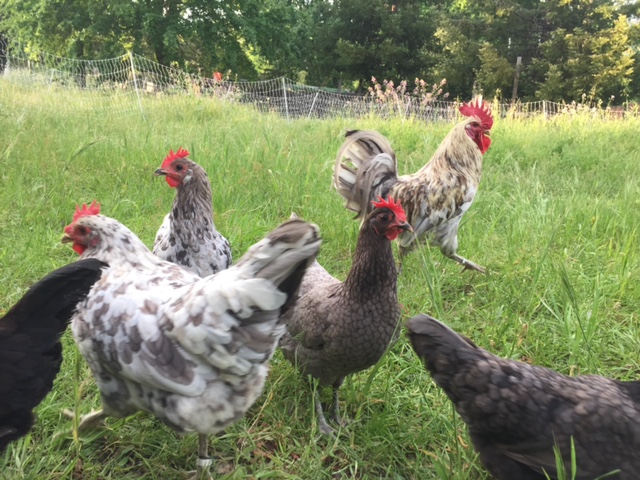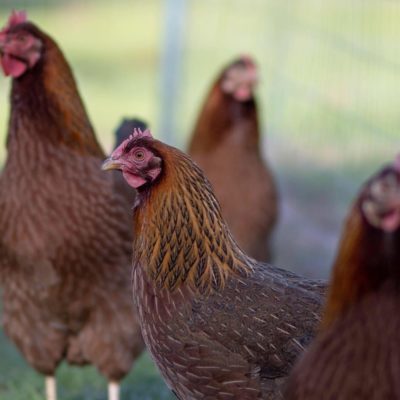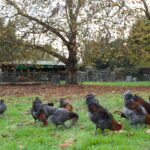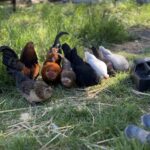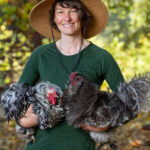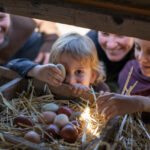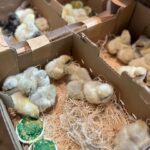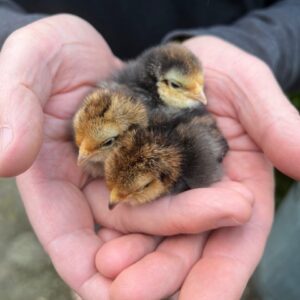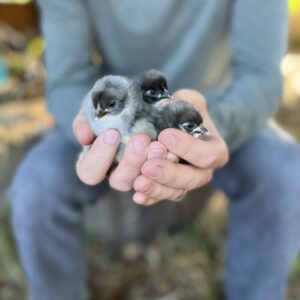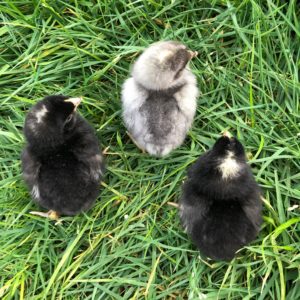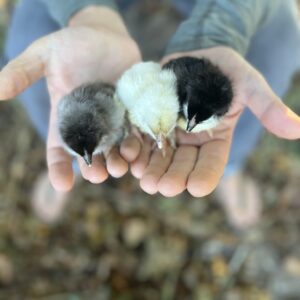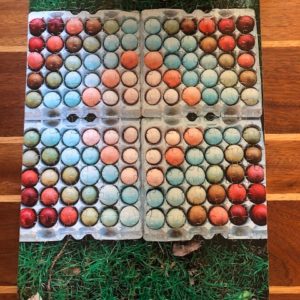Do you enjoy looking at colorful egg baskets and ever wonder which breeds laid which eggs? We are going to lay it all out here for you in this article!
French Black Copper Marans (or sometimes called marans chickens) lay dark chocolate colored eggs.
- French Black Copper Marans a rare breed that is gaining popularity, too achieve the desired true dark chocolate eggs it is important to purchase from a smaller breeder who is paying attention to the genetics. Large scale hatchery marans chickens will disappoint on the egg color.
- Marans chickens have a beautiful dark black plumage with a beetle sheen over top.
- They are known for laying large, dark chocolate eggs.
- They are a docile and friendly breed.
- Gender: they are sold straight run
If you are looking for a laid back and beautiful chicken breed, the French Black Copper Marans is a great option. They are sure to add a touch of elegance to your backyard flock.
Heritage Welsummer lay lighter brown eggs with dark speckles over the top
- Appearance: Welsummer chickens have a beautiful plumage that is a mix of brown, red, and black. The hens are typically a darker color than the roosters.
- Eggs: Welsummer chickens are known for laying large, dark brown eggs. The eggs are so dark that they are sometimes mistaken for being black.
- Temperament: Welsummer chickens are a docile and friendly breed. They are easy to handle and make great pets.
- Gender: They are sold straight run
If you are looking for an intelligent and beautiful chicken breed, the Welsummer is a great option. They are sure to add a touch of friendliness to your backyard flock.
German Bielefelder lay large beige with speckles to tan eggs.
- History: German Bielefelder chickens were first developed in Germany in the 1970s by crossing several different breeds, including the Lakenfelder, the Rhode Island Red, and the Wyandotte.
- Size: German Bielefelder chickens are a medium-sized breed, with hens weighing between 5 and 6 pounds and roosters weighing between 6 and 7 pounds.
- Lifespan: German Bielefelder chickens can live for 10-12 years.
- Temperament: German Bielefelder chickens are known for being docile and friendly. They are easy to handle and make great pets.
- Appearance: German Bielefelder chickens have a striking appearance, with a mix of black, brown, and white feathers. The hens are typically a lighter color than the roosters.
- Gender: German Bielefelder can be sexed upon hatch, we offer them as both guaranteed females and guaranteed females
Double Silver Laced Barnevelder lay smaller sized pinkish to tan eggs sometimes with speckles
The Double Silver Laced Barnevelder is a unique breed of chicken that is known for its incredibly beautiful plumage. The hens have a rich, dark black body, with a double silver lace pattern on their feathers. The roosters are a darker color, with a black body and a silver feathers throughout. Both hens and roosters have striking yellow legs. Our line of them are smaller than the average large fowl, not quite bantams and not quite a standard sized bird.
Double Silver Laced Barnevelders are also known for being good layers. They typically lay 4-5 eggs per week. Given the right conditions they can lay year round.
Double Silver Laced Barnevelders are a docile and friendly breed. They are easy to handle and make great pets.
- History: Double Silver Laced Barnevelders were first developed in the Netherlands in the 1800s. They were created by crossing several different breeds, including the Java, the Sumatra, and the Cochin.
- Gender: they are offered straight run
Isbar (some folks have renamed them Silverudd Blues) lay light green eggs sometimes with speckles over the top
Isbar chickens are a unique breed of chicken that is known for laying green eggs. They were developed in Sweden in the 1950s by a Catholic monk named Martin Silverudd. Isbar chickens are a cross between the Rhode Island Red, New Hampshire, and Cream Legbar breeds.
Isbar chickens are a medium-sized smaller framed bird, with hens weighing between 5 and 6 pounds and roosters weighing between 6 and 7 pounds. They have a wild streak in them and are predator wise while still being curious and friendly.
Isbar chickens are good layers, producing about 200 eggs per year.
- Plumage: Isbar chickens come in the feather colors blue, black, splash.
- Gender: offered straight run.
Bantam Cochin lay small cream to pinkish tinted eggs
- Friendly and docile: Bantam Cochins are known for being very friendly and docile chickens. The small size of them makes for great pets for children.
- Easy to care for: Bantam Cochins are relatively easy to care for. They do not require a lot of space and can be kept in a smaller sized area. If space is a hardship for you this could be a good backyard breed.
- Beautiful: Bantam Cochins are very beautiful chickens. They have a variety of colors and patterns, our 2023 line of cochins and beyond will have a 50/50 chance of being smooth or frizzle feathered which makes them extra cute and comical.
- Good layers: Bantam Cochins are good layers. They typically lay about 200 eggs per year, their eggs are not the largest but they are plentiful.
- Fun to watch: Bantam Cochins are fun to watch. They are very active and love to play. They are also very curious and love to explore their surroundings.
- Gender: Offered straight run
Moss Eggers lay a whole host of interesting dark greens.
- Eggs: Moss Eggers are known for laying a variety of colored eggs, including green, light green, and olive, dark green, dark green with a white bloom over top that sometimes can make them look silver and occasionally a bark brown.
- Temperament: Moss Eggers are a large docile, social, and friendly breed. They are easily trained to handle and make great pets.
- Gender: offered straight run
Olive Eggers first generation cross lay a reliably olive colored green egg.
- Plumage: our olive eggers come in blue and black feather colors
- Gender: offered straight run.
Sage Eggers lay lighter sage colored eggs with speckles over the top
- History: Sage Eggers were first developed in the United States at Alchemist Farm in 2014.
- Size: Sage Eggers are a medium-sized breed, with hens weighing between 5 and 6 pounds and roosters weighing between 6 and 7 pounds.
- Personality: smart, curious, excellent foragers with high predator awareness.
- Egg Production: They are remarkably prolific at 230+ eggs a year
- Gender: offered straight run.
Azure Eggers lay light blue to blueish greenish eggs
- History: Azure Eggers were first developed in the United States at Alchemist Farm in 2016.
- Size: Azure Eggers are a medium-sized breed, with hens weighing between 5 and 6 pounds and roosters weighing between 6 and 7 pounds.
- Personality: smart, curious, excellent foragers with high predator awareness and climate resilience
- Egg Production: They are remarkably prolific at 230+ eggs a year
- Gender: offered as guaranteed female or male.
Alchemist Blue Chickens lay blueish greenish eggs, sometimes with interesting blue speckles.
- History: Alchemist Blue Chickens were first developed in the United States at Alchemist Farm in 2019.
- Size: Azure Eggers are a medium-sized breed, with hens weighing between 5 and 6 pounds and roosters weighing between 6 and 7 pounds.
- Feathering: These svelt elegant birds come in blue and black feather colors
- Personality: smart, curious, excellent foragers with high predator awareness and climate resilience.
- Egg Production: They are remarkably prolific and dutiful layers at 230+ eggs a year. If given the correct circumstances they can lay year round.
- Gender: offered as guaranteed female or male.
